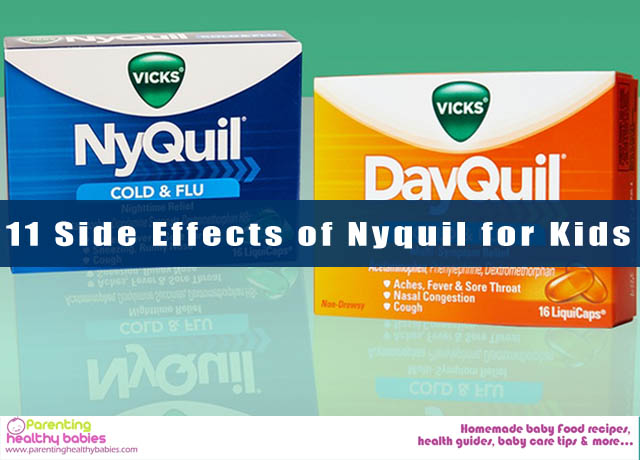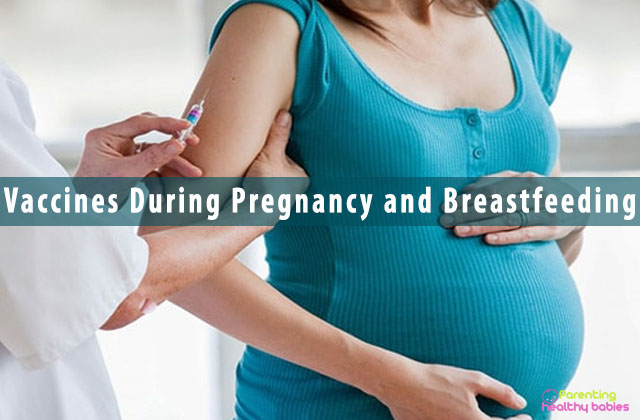Nyquil is a medicine that can be used to treat cold, flu and cough symptoms in kids. It is sold over the counter, which means it does not require a doctor’s prescription. It comes in the form of a pill or liquid.
Its four active components are- acetaminophen, doxylamine, dextromethorphan, and pseudoephedrine. This combination of components helps relieve the symptoms of sick patients and helps them to sleep. Each component of Nyquil deals with a particular symptom. When consumed in large quantities, each component causes serious health problems to the patient. Nyquil can be very dangerous and even fatal to children, just like any other medication for cold and cough.
Side Effects Of Nyquil For Children:
External Effect:
Even if you give Nyquil to your children under the guidance of your doctor, you can expect side effects such as: Dry mouth, Stomach ache, Urinary problems, Drowsiness Excitability. These side effects are just a byproduct of using Nyquil.
Internal Effect:
If you self-medicate your child, then you can expect more serious side effects, which include: Tremors, Mental confusion, Hysteria, Hallucinations, headache.
Other Major Side Effects Include:
Nervous system:
Dextromethorphan is one of the active medications found in Nyquil and is mainly responsible for the suppression of a cough in children. The side effects of this medication include nervousness and dizziness. A feeling of anxiety is also a reflection of the side effects in the nervous system.
Gastrointestinal:
The side effect of acetaminophen impacts the gastrointestinal system. Both medications contain irritating properties that can disrupt the stomach and intestinal lining. Side effects include nausea, with or without vomiting. Acetaminophen can induce nausea and vomiting, thus, causing a side effect in the liver.
Hepatic:
Side effects related to liver health from this ingredient include jaundice or yellowing of the skin and eyes.
Bruising:
Common side effects reported associated with Nyquil include easy bruising or bleeding, and unusual weakness.
Heart Hives:
Serious side effects that require immediate medical attention include allergic reactions, such as changes in the heart hives, seizures.
Swelling:
Swelling of the face, swelling of the tongue or throat.
Stroke:
A large overdose can cause a stroke. In rare and extreme cases, an overdose of doxylamine can cause secondary acute renal failure.
Overdose:
If it is consumed in large quantities, the side effect of overdose is usually perspiration; then it evolves and may suffer from jaundice, severe pain in the upper part of the stomach and confusion. When acetaminophen is consumed in extreme amounts, the symptoms may be convulsions, coma and liver failure. An overdose can cause death if it is not treated quickly. Every parent should take care of their children to know what to provide at the right time, substance abuse treatment for teens also helps to get rid of any abnormal addiction.
High Heart Rate:
Consumption of pseudoephedrine is not fatal unless an extreme amount of this substance is consumed. The common side effects of an overdose of pseudoephedrine are high heart rate and nervousness.
If you notice any of the above-mentioned problems, stop giving Nyquil to your children and take them to the doctor immediately. Some children may experience side effects other than those listed. Consult your doctor if you notice a symptom that worries you while you are giving this medicine to your child.
Nyquil Dosage For Kids:
Many studies indicate that OTCs such as Nyquil for children are strictly for children over two years of age, but other studies indicate that Nyquil is safe for toddlers or older children. It is important to know the weight of your child, as the dose depends on the weight of your child. Be sure to follow the instructions regarding weight and age. Also, if there is no dose on the medication label for children, consult your pediatrician or pharmacist.
Liquid Nyquil usually comes with a measuring device such as a dropper, spoon, syringe or cup to help measure the correct dose. It is important to always use these measuring devices to give your child the right dosage. If such device does not come with the drug, ask one from the pharmacist. If you are unsure of the correct dosage, consult your doctor. Self-medication can lead to many potential side effects and cause unpleasant reactions in your child.
Emergency help is needed if Nyquil causes side effects such as hives, difficulty breathing, tingling, swelling, especially of the face, tongue or throat. These can be signs of allergy that can be life-threatening.
Studies indicate that children between 4 and 6 years old should not receive Nyquil without the consent of a doctor, while children 6 to 12 years old may receive 15 ml or 1 tablespoon of Nyquil every 6 hours. When it comes to giving Nyquil children or any other medication, it is crucial to take safety precautions because it can help prevent many serious problems, including those that are life-threatening. So, the bottom line is that Nyquil is safe for six-year-olds, but the younger ones need a prescription from a doctor.
Dosage table:
| Age(Years) | Dosage(ml) |
| 4-6 | Should take with doctors consent only |
| 6-12 | 15 ml |
It is recommended to stop using Nyquil if side effects include rapid or irregular heartbeat, dizziness, nervousness or anxiety, confusion and disorientation, shallow breathing, bruising, high blood pressure, gastrointestinal problems such as nausea and vomiting, diarrhea, loss of appetite, sleep, problems with vision, poor memory or concentration, rash and ringing in the ear.
Precautions:
If your child has symptoms of colds and flu, you should talk to your doctor before taking any action. It’s important to keep in mind that giving drugs to children without consulting a doctor is dangerous, and it’s no different when it comes to Nyquil. Even though Nyquil for kids is readily available in your home, it is highly advisable that you talk to your doctor first and find out what you need to do next.
– Do not use it with other medicines that contain acetaminophen.
– Also, stop using it and ask a doctor if:
- Pain or a cough gets worse or lasts more than 7 days
- Fever gets worse or lasts more than 3 days
- Redness or swelling is present in the area that causes pain
- New symptoms occur
- A cough returns or occurs with a rash or a headache that does not go away.
– Ask your doctor if Nyquil should be used in cases where suffering from other conditions such as glaucoma, overactive thyroid, liver disease, cirrhosis, bladder obstruction, intestinal obstruction, heart disease, illness coronary heart disease, pheochromocytoma, etc.
– Ask your doctor before taking other medications because they can interfere with each other, leading to a fatal overdose.
– Consult a doctor before following situations:
- If you have glaucoma
- If you have a cough that produces a lot of mucus
- Have a respiratory problem or a chronic cough caused by asthma, chronic bronchitis or emphysema
- If you have trouble urinating due to an enlarged prostate
- If you are taking sedatives or tranquilizers
How To Use Nyquil?
If you are self-medicating with the product without a prescription, follow all instructions on the product packaging before taking it. In case you have any questions, ask your doctor or pharmacist. If your doctor has prescribed this medication, follow the instructions. Take the pill, or liquid form by mouth, with or without food. If stomach upset occurs, take it with food or milk. Your child’s age, medical condition and response to treatment are the crucial factors to decide the dosage. Do not take more medication than recommended for your age.
Use of common household spoon is not recommended as you may not get the correct dose. Put each dose on the tongue, let it dissolve completely and swallow it with saliva or water. Seek medical attention immediately if after 7 days your symptoms do not improve, get worse or return, if you have a fever, rash or a persistent headache, or if you think you have a serious medical problem.
Interactions With Other Medications:
Drug interactions can change the action of your medications or increase your risk of serious side effects. Carry a list of all the products you use (including prescription, over-the-counter and herbal products) and share it with your doctor and pharmacist. Do not start, stop or change the dosage of any medicine without your doctor’s approval.
Missed Dose:
If you are taking this medication following a dosing regimen and you miss a dose, take it as soon as you remember. If the time for the next dose is approaching, do not use the missed dose and return to your dosing regimen. Do not double the dose to catch up.
Overdose:
If you have severe symptoms of overdose, such as loss of consciousness or breathing difficulties, call 911. Symptoms of an overdose include agitation, hallucinations, severe drowsiness, confusion, seizures.
References:
https://www.drugs.com/drug-interactions/acetaminophen-dextromethorphan-doxylamine-pseudoephedrine,vicks-nyquil-d-cold-and-flu-nighttime-relief.html
https://www.webmd.com/drugs/2/drug-164883/vicks-nyquil-severe-cold-flu-oral/details













